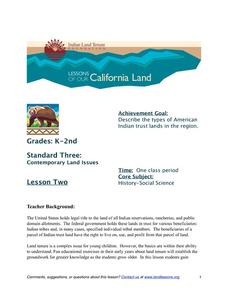Curated OER
Using the Calendar
In this math worksheet, students use a sample calendar to learn how to solve word problems. Detailed directions are given on how to solve different kinds of problems. There is a one page information sheet and one page of 15 word problems...
Curated OER
Scarcity of Land Throughout the World and in Hawaii
Students discuss the importance of "land." They review the four types of land classification--urban, rural, agricultural and conservation--and participate in an activity involving an apple that demonstrates the use of land in Hawaii....
Curated OER
Children of Alcoholics Group
Ninth graders identify characteristics of alcoholism, resources available to them and their family within the community and school, and look at strategies to help them increase safety and anger management strategies too.
Curated OER
Processing Satellite Images
Students comprehend the meaning of "pixel." They recognize patterns using pixels. Students observe how land use can be determined from a pixel. They measure off a 30 x 30-meter area to show the size of the surface area of one pixel....
Curated OER
Valentine Village
Students build a small city by using a half-gallon milk or juice carton to "build" a miniature home. They decorate their buildings with construction paper, yarn, beads, or whatever they have and become mailmen, delivering Valentine's to...
Curated OER
First You Take an Ecumene
Although this was written regarding Canadian agriculture, it can be used in any agriculture or environmental science class. Learners evaluate agricultural and economic activity maps and consider land use competition. Activities that get...
Curated OER
Ecology Explorers: Historical Air Photo Interpretation
Students identify and analyze land use changes over time with historic aerial photographs, and classify different land use into categories.
Indian Land Tenure Foundation
Indian Trust Lands
An important aspect of studying Native American history is understanding the nature of trust lands. Budding historians will learn that as Native Americans were removed from their home lands, trust lands were provided in the form of...
University of North Carolina
Relative Clauses
Knock, knock. Who's there? To. To who? No! To whom. Knowing when to use who versus whom is just one of the many topics covered on a handout about relative pronouns. Writers discover how to incorporate words such as whose, that, which,...
Curated OER
What Does It Cost to Use It?
Students investigate how electrical usage is counted. In this electricity lesson, students research an electric bill and define terms such as watts and kilowatts. Students calculate the average electricity cost per year by using a...
Curated OER
Student News And Weather Channel
Fabulous! Your 5th graders should love this project. As an ongoing lesson throughout the year students use temperature probes to record outside temperature and then document their data using spreadsheets. They use their weather data and...
Curated OER
Blogging to Create a Community of Writers #1: Setting Up the Blog
Writer's workshop is an idea that's been around for years. Students write, read, and comment on each others writing in an authentic and thoughtful way. Here is a 21st century twist, 6th graders will use the class blog to create a...
American Chemical Society
Electrolysis of Water
Young scientists know that water is H2O, but can they prove it? Through a simple electrolysis of water demonstration, scholars see the two gases produced as a result of a chemical reaction. Because this reaction doesn't happen...
Curated OER
Shaquille O'Neal Hand & Foot Span
If Shaquille O'Neal wears a size-20 shoe, how big are his hands? Learners will use the average ratios of foot length to hand span to calculate the hand span of Shaq, but first, they have to collect the data! They will...
Baylor College
Drugs, Risks and the Nervous System
In cooperative groups, middle schoolers contemplate the probability of 18 different situations occurring. After they make predictions, they compare them to the actual risk factors. This eye-opening exercise demonstrates that the odds of...
Curated OER
Sewing Unit (Textiles)
Get out that sewing machine it's time for a textile project. The class learns how to use a sewing machine, read a pattern, and create a simple article of clothing. They identify the sewing machine parts, use an iron, and think about...
Curated OER
Right to Remain Silent(?)
Learners consider the rights of journalists regarding source confidentiality, then create presentations on the New York Times' use of sources. They write guidelines to aid journalists in evaluating the trustworthiness of their sources.
Khan Academy
Project: Make it Rain
Make it rain on your computer screen with this challenging JavaScript programming project. Modify the existing code of one little drop to create a downpour by using arrays and properties of arrays. But why stop there? How about some...
University of Minnesota
Chemotaxis Using C. elegans
Have you ever wondered what roundworms are like? Or what they don't like? Explore the sensory preferences of C. elegans through this controlled chemotaxis experiment. Biology class members brainstorm what substances might attract—or...
Partnership for Educating Colorado Students
Mayan Mathematics and Architecture
Take young scholars on a trip through history with this unit on the mathematics and architecture of the Mayan civilization. Starting with a introduction to their base twenty number system and the symbols they used, this eight-lesson unit...
Premier Literacy
Point of View
Incorporate technology into a literature lesson with an innovative language arts lesson. Middle schoolers read an electronic version of original stories or fairy tales, and after determining the point of view, rewrite the tale from...
EngageNY
Modeling a Context from Data (part 2)
Forgive me, I regress. Building upon previous modeling activities, the class examines models using the regression function on a graphing calculator. They use the modeling process to interpret the context and to make predictions...
EngageNY
Advanced Factoring Strategies for Quadratic Expressions (part 1)
Factoring doesn't have to be intimidating. Build on prior knowledge of multiplying binomials and factoring simple trinomials to teach advanced factoring of quadratic expressions with a instructional activity that uses various methods of...
EngageNY
Solving Basic One-Variable Quadratic Equations
Help pupils to determine whether using square roots is the method of choice when solving quadratic equations by presenting a lesson that begins with a dropped object example and asks for a solution. This introduction to solving by...
Other popular searches
- Addition Using Manipulatives
- Creating Art Using Music
- Chemical Change Using Apples
- Lessons Using Apples
- Multiplying Using Arrays
- Math Using Arctic Animals
- Addition Using Grouping
- Addition Using Unifix Cubes
- Adding Decimals Using Money
- Cultural Studies Using Math
- Add Fractions Using Pictures
- Addition Using Manipulative's























